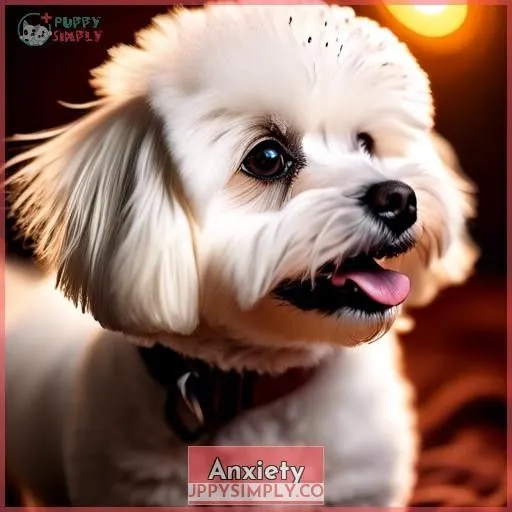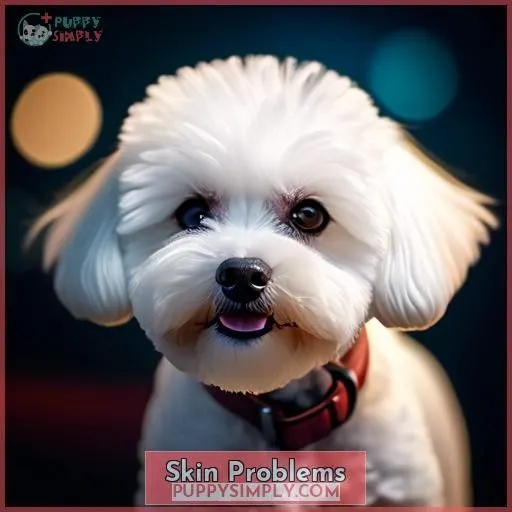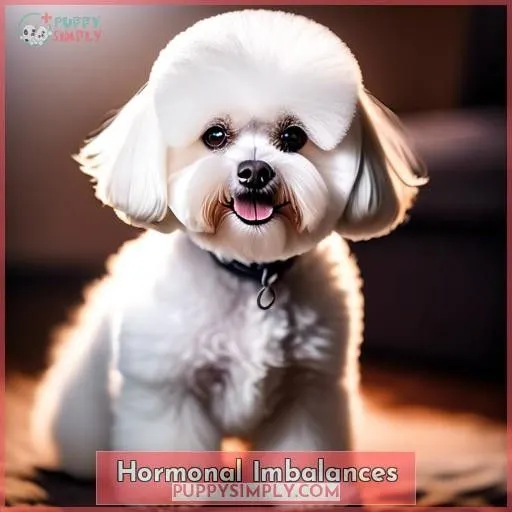This site is supported by our readers. We may earn a commission, at no cost to you, if you purchase through links.
Your bichon’s excessive shedding stems from an underlying condition disrupting the normal hair growth cycle.
Anxiety, skin problems like allergies or parasites, hormonal imbalances, and seasonal changes are common culprits.
Don’t dismiss it as just your hypoallergenic dog blowing its coat – shedding signals something requires attention.
While temporary shedding occurs, persistent hair loss warrants investigating potential health issues.
You’ll gain insights into identifying the root cause and restoring your bichon’s luxurious coat by exploring further.
Table Of Contents
- Key Takeaways
- Why is My Bichon Shedding?
- Individual Differences
- Anxiety
- Skin Problems
- Itching
- Hormonal Imbalances
- Seasonal Shedding
- Health Issues
- Frequently Asked Questions (FAQs)
- How often should I brush my Bichon Frise to prevent excessive shedding?
- What are the common causes of excessive shedding in Bichon Frises?
- How can I determine if my Bichon Frises excessive shedding is due to a health issue?
- What should I do if my Bichon Frise is shedding more than usual?
- How can I maintain my Bichon Frises coat to minimize shedding?
- Conclusion
Key Takeaways
- Excessive shedding in Bichon Frises is often due to underlying health issues, such as allergies, hormonal imbalances, and skin problems.
- Regular grooming, a balanced diet, and professional grooming can help manage shedding.
- Anxiety can also cause excessive shedding in Bichon Frises.
- Seasonal changes can lead to increased shedding in Bichon Frises.
Why is My Bichon Shedding?
Your Bichon Frise is shedding excessively due to a variety of reasons.
Allergies to environmental factors, food, or fleas can cause itchy skin and hair loss.
A poor diet lacking essential nutrients can contribute to excessive shedding.
Hormonal imbalances, such as hypothyroidism or Cushing’s disease, can also lead to hair loss.
If your Bichon Frise is shedding more than usual, it’s crucial to explore the potential causes and take appropriate steps to address the issue.
This may involve changing your dog’s diet, increasing grooming sessions, consulting with a veterinarian, maintaining a clean environment, or considering professional grooming services.
Individual Differences
As a Bichon Frise owner, you might be surprised to find your hypoallergenic dog shedding more than expected. While Bichon Frises are known for their minimal shedding, individual differences can lead to variations in hair loss. Here are some possible reasons for excessive shedding in your Bichon Frise:
- Poor nutrition: A diet lacking essential nutrients can contribute to excessive shedding. Make sure your Bichon Frise is receiving a balanced and high-quality diet that supports healthy skin and coat.
- Hormonal conditions: Hormonal imbalances can also cause increased shedding. Consult with your veterinarian if you suspect hormonal issues may be contributing to your dog’s hair loss.
- Seasonal shedding: While Bichon Frises don’t have a traditional shedding cycle like other breeds, they may shed more during seasonal changes.
- Health issues: Underlying health problems, such as allergies, skin infections, or parasites, can cause excessive shedding. Regular veterinary check-ups can help identify and address any health concerns.
To manage your Bichon Frise’s shedding, consider the following solutions:
- Add fish oil or omega-3 fatty acids to your dog’s diet: These supplements can improve skin and coat health, reducing the likelihood of excessive shedding.
- Regular grooming: Brushing your Bichon Frise daily can help remove loose and dead hairs, preventing matting and tangles.
- Professional grooming: If your Bichon Frise’s shedding persists, consider taking them to a professional groomer for specialized treatments and coat care products.
Anxiety
Anxiety can be a significant cause of excessive shedding in Bichon Frises. If your Bichon Frise is shedding more than usual, it could be due to anxiety. This might be triggered by specific situations, such as thunderstorms or the presence of strangers, or it could be a more generalized anxiety. In some cases, anxiety can be related to underlying medical conditions, such as adrenal gland disorders or growth hormone imbalances. It’s crucial to consult with a veterinarian to determine the cause of your Bichon Frise’s anxiety and develop an appropriate treatment plan.
To address anxiety in your Bichon Frise, consider the following steps:
- Identify the trigger: Determine what’s causing your dog’s anxiety. This could be a specific situation, a medical condition, or a combination of factors.
- Behavior modification: Work with a professional dog trainer to develop a behavior modification plan. This may involve desensitization techniques, counterconditioning, or other training methods to help your dog cope with anxiety-producing stimuli.
- Medication: If behavior modification alone isn’t effective, your veterinarian may prescribe anti-anxiety medications. These can include benzodiazepines like diazepam, selective serotonin reuptake inhibitors (SSRIs) like fluoxetine, or other medications like clomipramine.
- Environmental changes: Make adjustments to your dog’s environment to reduce stress. This could involve creating a safe space, providing plenty of toys and comfortable bedding, and minimizing exposure to anxiety-producing stimuli.
- Lifestyle changes: Make sure your dog receives regular exercise, a balanced diet, and plenty of attention. These factors can help reduce anxiety and improve overall well-being.
Skin Problems
Skin problems can cause severe distress for Bichon Frises, leading to hair loss and discomfort. Here are three key points to bear in mind:
- Sebaceous cysts: These cysts develop when the oil produced by the skin blocks the hair follicles, causing cysts along the follicle. They can be confused with ingrown hairs but require veterinary attention for treatment and to prevent infection.
- Flea bite sensitivity: Bichon Frises are more sensitive to flea bites than other breeds, which can cause localized reactions and itching. Regular flea prevention is essential to avoid these issues.
- Food allergies: Bichon Frises can develop allergies to certain foods, which can show up in skin issues. Identifying and eliminating the allergen from their diet is vital for their well-being.
If your Bichon Frise is experiencing skin problems, consult a veterinarian for a proper diagnosis and treatment plan.
Itching
If your Bichon Frise is excessively licking its paws, it could be a sign of an underlying issue. Allergies, parasites, food sensitivities, and dry skin can all cause itching, leading to excessive licking.
To address this, you can try adding fish oil or omega-3 fatty acids to your dog’s diet, such as the allerG-3 omega 3 fatty acids.
If the issue persists, consult a veterinarian to rule out any medical conditions and discuss potential treatments.
Hormonal Imbalances
Just like us, your Bichon Frise can experience hormonal rollercoasters that impact their coat. Think of it as their version of lactation or menopause, but with more fur involved.
Conditions like Cushing’s disease or thyroid issues can throw their hormones out of whack, leading to unexpected shedding.
It’s not just about genetics; diet and health play huge roles too.
So, if your fluffy friend starts looking a bit patchy, it might be time to investigate deeper into their health, beyond just battling food allergies.
Seasonal Shedding
As the weather changes, you may notice your Bichon Frise shedding more than usual. This is a common occurrence for many breeds, including Bichon Frises, and is often related to the seasonal changes in climate. Bichon Frises have a double coat, consisting of a soft undercoat and a curly outer layer, which provides some insulation against cold temperatures. However, when the weather gets warmer, their coats may start to shed more excessively.
To help manage seasonal shedding, consider the following tips:
- Diet: Make sure your Bichon Frise is receiving a balanced and high-quality diet that supports healthy skin and coat.
- Grooming: Increase the frequency of grooming sessions to remove loose and dead hairs from your Bichon Frise’s coat. Use a quality brush designed for Bichon Frises, such as a slicker brush or a comb with wide teeth, to prevent matting.
- Check for underlying health issues: Excessive shedding can sometimes be a sign of an underlying health problem, such as allergies, skin infections, hormonal imbalances, or parasites. Consult with a veterinarian if you’re concerned about the amount of shedding.
- Maintain a clean environment: Regularly vacuum and clean your home to minimize the accumulation of shed hair.
- Professional grooming: If the shedding persists or becomes unmanageable, consider taking your Bichon Frise to a professional groomer for specialized treatments and coat care products.
Health Issues
If your Bichon is shedding excessively, it could be due to a health issue. Here are three common causes:
- Allergies: Your Bichon might be allergic to something in its environment or food. Look for signs like constant itching, excessive drinking, and frequent panting.
- Parasites: Fleas, ticks, and mites can cause itching and lead to excessive shedding. Check your pet for these pests and consult a vet if necessary.
- Diet and Medications: Changes in diet or new medications can cause digestive issues, which can lead to skin problems and excessive shedding. Make sure your Bichon’s diet is balanced and discuss any medication concerns with your vet.
Frequently Asked Questions (FAQs)
How often should I brush my Bichon Frise to prevent excessive shedding?
You should brush your Bichon Frise at least once a week to remove loose hair and prevent matting. More frequent brushing (2-3 times per week) helps minimize shedding even further.
What are the common causes of excessive shedding in Bichon Frises?
Like a snowflake’s uniqueness, each Bichon has its shedding quirks. Hormones, allergies, poor diet – these culprits can turn your pup into a furry tornado. But don’t fret, with some sleuthing, we’ll get to the root and restore that lush, shed-free coat.
How can I determine if my Bichon Frises excessive shedding is due to a health issue?
To identify if your Bichon’s excessive shedding is health-related, watch for signs like itching, dry skin, or behavior changes. Check for fleas, allergies, or underlying conditions like thyroid issues. If concerned, it’s best to consult your vet for an examination.
What should I do if my Bichon Frise is shedding more than usual?
Like a magician’s robe, excessive shedding exposes an underlying problem. Pay a timely visit to your veterinarian to eliminate allergies, skin ailments, or hormonal disruptions. They’ll prescribe bespoke guidance to restore your Bichon’s healthy, luxuriant coat.
How can I maintain my Bichon Frises coat to minimize shedding?
To minimize shedding, brush your Bichon regularly with a slicker brush, bathe monthly, and maintain a high-quality diet rich in omega-3s. Consistent grooming removes loose hair while nourishing their coat from within.
Conclusion
Excessive shedding in your bichon signals an underlying issue disrupting its coat’s normal growth cycle.
Have you identified the root cause?
Address potential health conditions like allergies, hormonal imbalances, or skin irritations to restore your hypoallergenic dog’s luxurious coat.
Early intervention prevents persistent hair loss.
So why is your bichon shedding?
Consult your veterinarian for a comprehensive evaluation and customized treatment plan.














